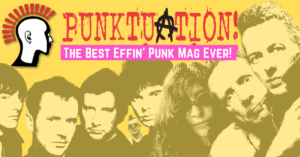With no contract, booze, drugs or big bucks in sight Ian MacKaye and friends set up an independent record label 41 years ago and gave US punk a conscience.
In 1980 the U.S. was on the cusp of Reagan’s Presidency. The charts were home to acts such as Michael Jackson and Olivia Newton-John, and the highest-grossing film of that year was The Empire Strikes Back.
But in Washington D.C., in the shadow of the White House preparing for its new President after Carter’s electoral loss, a group of friends started a record label (which in turn would nurture a thriving community) to put out their friend’s records and keep the punk dream alive.
Dischord was started at the turn of the 1980s by Ian MacKaye and Jeff Nelson- at the time members of hardcore punk band Teen Idles. The beginning of the label was a necessity- they figured no one else was going to distribute their music and therefore they would have to do it themselves.

.
1000 copies of their first release Minor Disturbance EP, were pressed and the covers were put together by hand with scissors and glue. Teen Idles were short-lived but their original intention lived on, as Ian MacKaye recalled later:
“Teen Idles played for a year and then broke up. We saved every dollar we ever made. It was in a cigar box. So, when we broke up, instead of splitting the money between the four of us — each getting two-hundred-and-some dollars — we decided that we would document the music that we had been making.”

They learned how to physically put together sleeves for 7-inch singles by reverse-engineering ones already made to see how they fit together. They designed album covers and had them photocopied, ready to stick onto the sleeve template:
“That, my friends, is the record industry. The is the true record industry. It was incredible to sit with people — your friends — and make records together. It was an amazing experience,” MacKay said.

It may have started as a means to an end but from the very beginning, Dischord has prided itself on its politics and philosophy as much as its musical output.
It has been home to hardcore heroes such as Fugazi, Minor Threat and a whole host of other grassroots bands that shared MacKaye et als vision for a unified punk ethos that maintains its values of community, non-greed, and outsider triumph.
The label is synonymous with ethics, integrity, and steadfast adherence to a sense of purpose and meaning. Over the years, Dischord would do more than just put out records, it would promote values and behaviours intended to make the world a better place.
It was always intended to be a DIY endeavour, keeping pretty much everything in house- producing all of its albums and shying away from money-making ‘merch’. Instead, selling records at discount prices, evading interference from bigger labels or distributors.
It is this self-sustaining status – backed by a group of hardworking and dedicated volunteers (Dischord has few employees so many volunteers have helped over the years) – that has made its legacy intrinsically linked to that of American Hardcore punk.
It is difficult to have a conversation about that era of punk without including the role of Dischord in creating a community and nurturing the expansion of the genre musically and logistically.
As well as altruistic and staunchly egalitarian, Dischord’s penchant for shunning the profitable and the corporate is true punk rock rebellion in itself:
“We started and continue to exist on the fringe,” says MacKaye.
The initial impact of seeing this small, cooperative outfit actually taking practical steps to get music out into the community was empowering for local youth and musicians who realised you didn’t have to be in awe of the corporate music industry big hitters – you could create what you wanted to create and get it out there yourself. A true punk idea.

They weren’t alone – other independent labels, with an inclination to act almost exclusively in their local area, sprung up across the US from the late ’70s through to the early ’90s.
Labels like STT Records (started by Greg Ginn in California), Touch and Go Records (home to Detroit bands like Butthole Surfers) and Minnesota’s Twin/Tone Records collectively kept the vibrancy and viability of local scenes alive.
“We started and continue to exist on the fringe,” Ian MacKaye, Dischord Records
Tweet
Also tangled up in the hardcore history narrative is that of the straight edge movement which can be traced back to MacKaye’s anti-rockstar stance which was expressed strongly via his next project – Minor Threat.
Although the music was loud, aggressive, and sounded destructive, the actual message was anything but – it was about respecting yourself and your neighbour enough to abstain from alcohol, drugs, and conquest-led sexual endeavours, henceforth known as the straight edge movement.
Although the movement has its critics (mainly due to the over-zealous policing by some members of the scene), its original aim was to create a safer gig space and allow younger fans into shows by not allowing alcohol sale on-premises.
In the same city that was home to the President, Dischord became a home for local hardcore acts who wanted their music to be put out by likeminded people, dedicated to strengthening and expanding the punk scene.
A shared house which came to be known as ‘Dischord House’ become the hub of the activity – teams of volunteers would hunker down to assemble records; there was a rehearsal space in the basement, people (including MacKaye) worked numerous day jobs to keep themselves financially solvent so they could redirect their energies to their DIY label. It’s not easy maintaining a punk ethos in a fiercely capitalist world, but Dischord managed it.
The shows from the roster of Dischord’s bands (which included Minor Threat, Fugazi, Government Issue, Dag Nasty and numerous others) started to attract the violent skinheads who were perhaps drawn by the reputation for violence that the shows had garnered.
Many of the original cohorts of bands had split up by the mid-1980s. Still, the label kept going and embraced those bands branching out in different directions musically and becoming less about power and force in the music and more about melody and emotional content.
Although the sound of the music and tone of the shows may have slightly adapted, the integral role of the label’s politics never wavered, and MacKaye is as dedicated to these ideals today as he ever was.
The label has never used contracts or got lawyers involved, and perhaps that is why the scene was considered quite insular because the label didn’t want to do business with those who didn’t share their ideas, lest there be conflict and bad feelings.
It is an unconventional way to run a business in a country that champions the money-making entrepreneurial spirit and worships the dollar sign. The group were not without their critics as MacKaye remembered in 2015:
“From the beginning of this label, people have said that the way we do things is unsustainable, unrealistic, idealistic, and we were dreaming. Well, the dream is now 35 years old, so they can go fuck themselves.”
The label continued to grow in the 1990s as they were shifting a significant amount of units and gaining loyal fans and followers across the country as hardcore fandom spread.
“From the beginning of this label, people have said that the way we do things is unsustainable, unrealistic, idealistic, and we were dreaming.” Ian MacKaye, Dischord Records.
Tweet
They have remained dedicated to selling their records at low prices, putting their money where their mouth is in terms of keeping themselves an accessible and authentic haven for all who want to be engaged with the punk scene, in whatever capacity.
Although they release a small number of records now, their primary role is in archiving the photos, videos, and recordings of the entire Washington hardcore scene; keeping for posterity the slam dancing footage, the incredible live photos and the copious amounts of EPs, albums etc. that tell the story of what can be achieved when the concepts of music and community are fused together.
More Dischord Records
Enjoyed this article? Have a look at these…
I’m Molly Tie- I Love punk! I play drums (badly), write a lot about punk (not as badly) and I’m particularly interested in issues relating to women in the music scene.






 Did you know that we are 100% DIY? We run our own game. No one dictates to us, and no one drives what we can or cannot put on our pages – and this is how we plan to continue!
Did you know that we are 100% DIY? We run our own game. No one dictates to us, and no one drives what we can or cannot put on our pages – and this is how we plan to continue!
